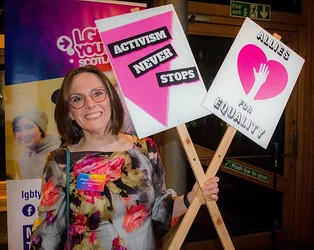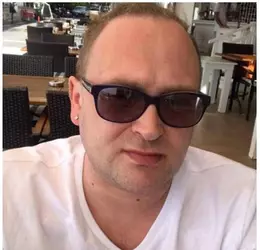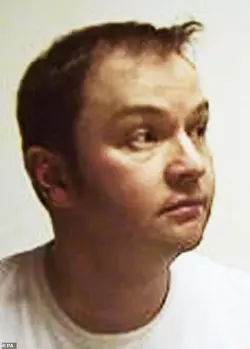M GRANT FOR THE SCOTTISH DAILY MAIL
Published: 21:11, 6 September 2024 | Updated: 23:35, 6 September 2024
The booklet was billed as an essential guide to ‘coming out’ as
transgender, purporting to provide key facts and lay myths to rest.
Setting out its stall within a few pages, it declared that trans people are those whose ‘
gender identity - who they are internally or their “innate” gender - is different to their physical body or the gender they were assigned at birth’.
But it stressed that the term ‘transgender’ describes a ‘whole range of people and takes many forms from cross-dressers to transsexuals to people who reject male and female genders altogether’.
More detail is provided over 40 pages - with advice on surgery, hormones, and transitioning.
But this guidebook wasn’t written for adults; it was aimed at pupils as young as 13 - and it was co-written by Andrew Easton, who was later convicted of downloading and distributing indecent images of children, including newborn babies.

Dr Mhairi Crawford, the current chief executive of LGBT Youth Scotland
It was produced by LGBT Youth Scotland, a charity which receives more than £1million a year of funding from a variety of sources, including the SNP Government, local authorities - and even the cash-strapped NHS.
Easton, 39, who was caught with dozens of video files - some containing the most serious category of child abuse images - was snared by cybercrime officers over internet chats with someone he believed to be a vulnerable 13-year-old he called ‘baby boy’. He was convicted last month, avoiding prison in favour of a Community Payback Order.
LGBT Youth Scotland admitted Easton had contributed to an early version of the ‘coming out guide’ which it said may still be in use but has been superseded by another, similar, document - ‘co-produced with young people aged 13-25 who are trans, non-binary or are questioning their gender identity’.
The current publication, available online, advises children that teachers must not let their parents know about a gender change unless they are ‘at risk of harm’ - while pupils are also told how to officially change their name at school.
Yet, as we shall see, this is far from the first time the organisation has been mired in scandal - including a former boss who was exposed as a member one of Britain’s worst paedophile rings and convicted of appalling child sex abuse, including a sickening attack on a baby boy.
For decades it has survived any number of controversies, with high-level backing, and has secured a foothold in almost every area of public life from education to health and justice - sustained by enormous sums doled out by government and public bodies.
Enormous influence over the public sector
The Easton revelations were the final straw for Children in Need, the BBC charity, which told the Mail it had ended its funding of LGBT Youth Scotland over concerns that the ‘reputational risk to the charity and the young people that we support was considered too great to continue the relationship’.
Astonishingly, Police Scotland has said it will ‘continue to work’ with LGBT Youth Scotland, which has been signed up to run a diversity training initiative for its call-handling staff.
Yet last year the single force withdrew from a diversity scheme run by another controversial gay and transgender rights group - Stonewall - which had been criticised for its stance on trans issues.
It’s an illustration of the enormous influence LGBT Youth Scotland continues to wield over the public sector, with the goal of promoting equality for gay and trans workers, and schoolchildren - more of which later.
The bosses and trustees of the charity - some with links to the SNP Government - must now be fearful that other funders will follow Children in Need’s example and pull the plug on their grants.
The only surprise is that it has taken so long for these bodies to abandon the group, or consider doing so - yet for years it has enjoyed the support of government at the highest levels.
LGBT Youth Scotland began life in November 1989 as the Stonewall Youth Project, launched by members of the gay community in Edinburgh, before changing its name to LGBT Youth Scotland in 2003.
From humble beginnings, it went on to win the support of Nicola Sturgeon - who visited its Edinburgh headquarters in 2018 to mark the Year of Young People - while equalities minister Kaukab Stewart has praised the charity’s work - saying she is ‘proud that Scotland is recognised as a good place to live and grow up for LGBT young people’.
Last year, Ms Stewart and other SNP politicians were pictured at a demonstration in Glasgow in front of a placard which read ‘decapitate TERFS’ - a derogatory term used towards those who hold gender-critical beliefs - but they claimed not to have noticed what was written on the sign.
Yet the continued existence of LGBT Youth Scotland - thanks to millions of pounds from the taxpayer - is remarkable, given that in 2009 its former chief executive, James Rennie, was handed an Order for Lifelong Restriction - a form of life sentence - for child sex offences including carrying out and videoing a horrific sexual attack on a baby boy.

LGBT Youth's 'coming out' guide was co-written by Andrew Easton, who was later convicted of downloading and distributing indecent images of children
Ex-teacher Rennie, who was then 38, was one of eight men exposed as members of Scotland’s biggest paedophile ring.
For four years, he molested the toddler son of unsuspecting friends while babysitting - recording the abuse and sharing it with other perverts.
He was an SNP Government adviser on child sex issues - and his trial heard that he had used computers at the LGBT Youth Scotland’s offices in Leith to pursue his sordid double life.
Rennie had been the government’s most important and influential adviser on gay issues affecting children, advocating the legalisation of same-sex adoption.
Yet the Mail can reveal that ministers ordered no inquiry, believing that Rennie’s conviction drew a line under the matter - and the money kept flowing into the coffers of LGBT Youth Scotland, under a different leadership.
In December 2022, the charity referred itself to Police Scotland over historical allegations of links to child grooming and sexual exploitation (unconnected to Rennie) - after Sam Cowie said he had been raped and sexually assaulted by strangers as a result of safeguarding problems at LGBT Youth Scotland more than a decade previously.
He said that when he was 15 he was given cigarettes and alcohol by employees of the charity, and alleged that he had been taken to bars where he was assaulted and raped by men.
Police Scotland later said ‘enquiries were carried out and no criminality was established’ - but even the police probe didn’t stop the steady flow of income.
In January last year, at a time when the police investigation was ongoing, it emerged that SNP-run Glasgow City Council - Scotland’s largest local authority - had agreed funding to LGBT Youth Scotland of more than £190,000.
The decision to continue handing it cash was described by the city’s Tory MSP, Annie Wells, as ‘alarming’ and ‘irresponsible’.
Council bosses, who were considering cost-cutting plans to axe more than 800 teaching posts, said the cash was needed to support four youth groups per week, as well as one-to-one support, and insisted ‘monitoring of organisations is carried out by [council] officers for the duration of the grant period’.
Asking pupils as young as four if they are gay
In February 2023, while the Police Scotland grooming investigation was ongoing, members of the Scottish LGBTI Police Association - representing gay police officers and civilian staff - posted on social media details of their efforts to raise funds for LGBT Youth Scotland.
The charity is largely taxpayer-funded, receiving £447,000 from the Scottish Government, £345,000 from Scottish councils and £154,000 from the NHS in 2023 - huge sums which Scottish Tory MSP Stephen Kerr said amounted to a ‘national scandal’.
Of its total income of £1.4million [the rest came from trusts and foundations], it spent £1.3million on staffing costs, employing 48 project managers and staff, including chief executive Dr Mhairi Crawford.
The total remuneration paid to ‘key management’ in 2023 was £254,648, while one unnamed member of staff received earnings of more than £60,000.
Nothing, it seems, can loosen the grip of this organisation on large swathes of public life - notably the education system.
Last year, it emerged nearly 60 per cent of secondary schools in Scotland had adopted a charter to support ‘inclusivity for staff and pupils’ under a scheme set up by LGBT Youth Scotland to provide schools with training to challenge prejudice and promote equality and diversity.

Meanwhile, primary schools are appointing children as ‘LGBT champions’ - and are being urged to consider asking pupils as young as four if they are gay, lesbian or transgender.
Headteachers have been urged to install gender-neutral toilets - and mark Transgender Day of Remembrance.
Schools which signed up to the charity’s scheme, for a fee normally of at least £850, were ranked on how well they catered for LGBT pupils and were given guides to follow to best achieve this.
Secondary pupils are also being encouraged to sign LGBT rainbow flags, with children asked to ‘celebrate the rainbow’ through the way they dress, and by decorating their schools - described by Chris McGovern of the Campaign for Real Education as ‘brainwashing’.
The charity insists that ‘with [an] increasingly toxic and polarised public debate, it’s vital that all young people feel safe, supported and included’.
The Daily Telegraph reported in April that one school which is part of the LGBT charter initiative, Dunbar Grammar, organised a ‘HappyFest’ event in 2020 including two drag acts, with one called Auntie Climax.
East Lothian Council said the school did organise an event called HappyFest, but was unable to ‘confirm the acts’ which featured.
This week an Edinburgh school which signed up to the LGBT Youth Scotland charter scheme was accused of teaching ‘propaganda’ to teenage pupils after they were told transgender people are regularly murdered for being who they are.
Teaching resources showed that children are being informed that ‘many’ transgender people are killed ‘simply because they try to be themselves’, in a lesson about hate crime.
LGBT Youth Scotland declined to comment, while Joan Griffiths, education convener at the City of Edinburgh Council, said that ‘as soon as this issue was raised, the resources were destroyed’.
Under its boss, Dr Crawford, LGBT Youth Scotland has helped to shape the SNP Government’s policy on transgender reform - which has been dogged by disaster.
It was a vocal supporter of abortive moves to allow gender self-identification from the age of 16 - down from 18 - which were blocked by the UK Government.
Close links between the charity’s board and the SNP Government may have helped its mission to attempt to drive through changes to the law on transgender recognition.
Trustee James Blair was formerly a civil servant who specialised in ‘equalities projects’, while fellow board member Lewis Shand Smith was chairman of the government’s now-disbanded Energy Consumers Commission.
In April, LGBT Youth Scotland strongly condemned a decision by the Sandyford Young People’s Gender Services, based at NHS Greater Glasgow and Clyde, to stop the routine prescription of puberty blockers, in the wake of the Cass Review.
The expert report, by Baroness Cass, warned of the potential dangers of ‘social transition’, including in schools, saying it could lead to children pursuing a ‘medical pathway’ in a bid to resolve gender issues, which may not be in a child’s best interests.

In 2009 LGBT Youth Scotland's former chief executive, James Rennie, was convicted of sexually assaulting a baby
Social transitioning is when someone begins to live as their preferred gender in public, for example, changing pronouns, wearing different clothing, and going by a different name - all of which have been by backed by Dr Crawford and her colleagues.
She declined a request for interview, and a spokesman for the charity said it was ‘unwilling’ to comment on the issues raised by our investigation, including Children in Need’s withdrawal of funding.
LGBT Youth Scotland said Easton had never been an employee or volunteer but confirmed that until 2009 he had been a member of one of its ‘youth groups’, and that he had contributed to an early version of the ‘coming out’ guide.
It said it would ‘condemn anyone that exploits or harms young people’.
The Cass Review was finally accepted in full by the SNP Government this week - the barrier to implementing it sooner had been the Greens, but that obstacle was removed when they were kicked out of government, sparking the downfall of Humza Yousaf as First Minister back in May.
Its belated decision to back the review might be an ominous sign for LGBT Youth Scotland’s bosses - an indication that the tide is turning against some of the radical trans ideology it has championed.
Extraordinarily, ministers say they will continue to fund the organisation - as they always have - as if the scandals over paedophilia and the alleged ‘brainwashing’ of children had never happened.
One final question remains unanswered - just what would it take for the SNP to turn its back on one of Scotland’s most toxic charities?



